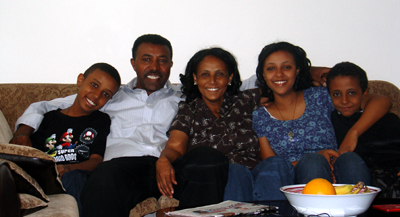Eight years ago, Aaron Berhane left his wife and three children behind as he fled his native Eritrea, a fugitive wanted by authorities because his newspaper had dared criticize the government of revered independence leader Isaias Afewerki. In May 2009, Berhane’s family managed to escape to Sudan. This month, at last, they joined him in Canada.
“It doesn’t seem like reality. I had several good dreams like this,” the former editor-in-chief and co-founder of Setit, once Eritrea’s largest circulation newspaper, told me when I spoke to him on May 6, shortly after his family arrived in Toronto. I cannot possibly imagine the thoughts racing through Berhane’s mind, but I wanted to find out how he and his family endured years of separation.
For a while, as Berhane successfully pressed on with journalism in Canada, the odds of reuniting with his distant family appeared insurmountable. “When I left, I never expected to see them again. I wasn’t sure whether I was going to make it or not,” Berhane told me, referring to the perils of crossing the Eritrean border.
It was late night on January 5, 2002, and after more than 100 days in hiding, Berhane had decided it was time to leave the Eritrean capital, Asmara. Before setting out on the dangerous journey, he had one more wrenching thing to do: Bid his family goodbye, or even farewell. “My youngest son was only 6 months old. I had to go home to say goodbye when they were sleeping. I thought I was going to disappear forever.”
It was only the beginning of a harrowing separation the family would endure for eight long years. “It was very tough for me and my wife. Her activities were being monitored.” With his wife under constant surveillance, Berhane developed a coded language to communicate with her. “For example, if I want her to go to the Internet café, I tell her, ‘You have to visit my mom.’” The conversations were difficult. “My kids always asked, ‘Are you coming this year? Are you going to finish your school?’ They only knew that I was away to study for my master’s degree. It was painful to hear them saying, ‘My birthday is next month. Are you coming?’ It killed me.” For some time, the government denied Berhane’s wife, Miliete, food ration cards; officials often harassed her or frustrated her efforts to get public services.
To escape from Eritrea, Berhane’s wife had to elude the people the government assigned to monitor her. “Even to travel from Asmara to any neighboring city, she was being followed. She was scared,” Berhane told me, adding that his wife passed through about 20 security checkpoints in order to leave.
This spring—with the help of Massey College, where Berhane had earned a fellowship, and support organizations such as the Canadian Journalists for Free Expression—the family was finally able to secure travel arrangements from Sudan to Toronto.
“My kids are grown up. They are with me—it is unbelievable,” Berhane said with evident relief. His oldest, 17-year-old Frieta, would have been enlisted in Eritrea’s mandatory military service this summer. “Indeed it is the greatest relief to see my daughter escape from the trap of the endless military service.”
Despite the good news, Berhane is unsatisfied. “I am really happy that finally my despair is over, but my happiness will only be fulfilled when I see the same reunions between my colleagues in jail and in exile and their loved ones.” CPJ research shows 19 journalists are imprisoned in Eritrea, many of them held in secret locations without due process or evident medical attention.
